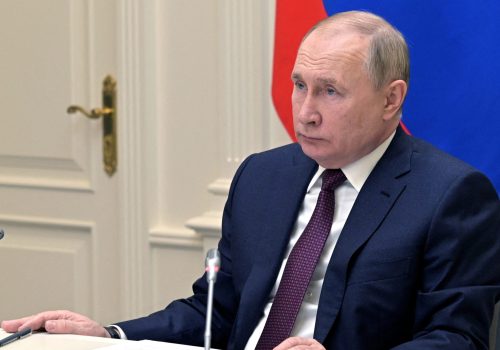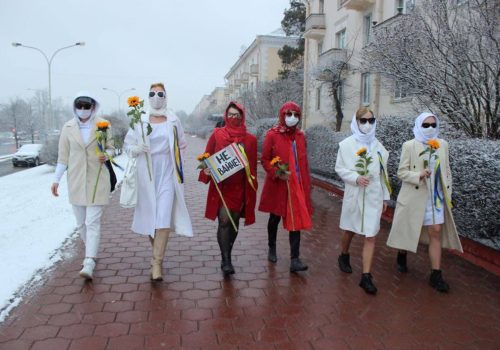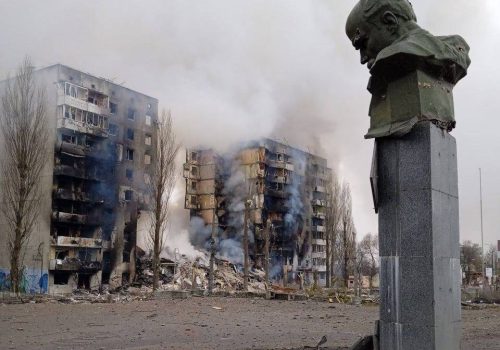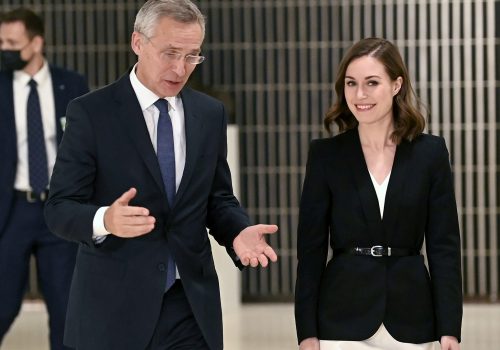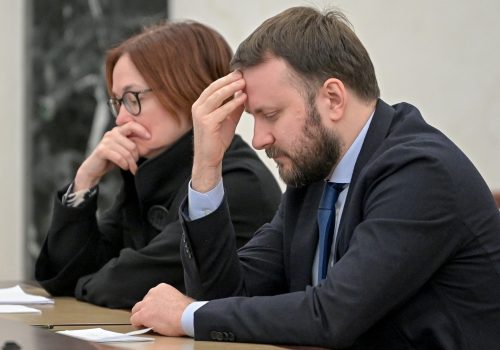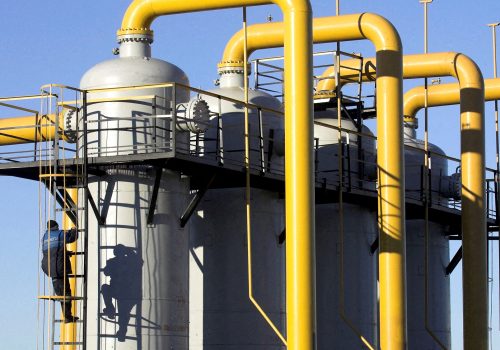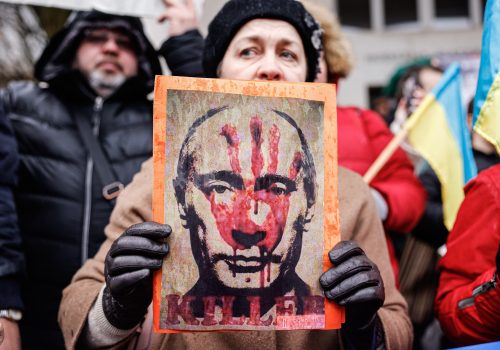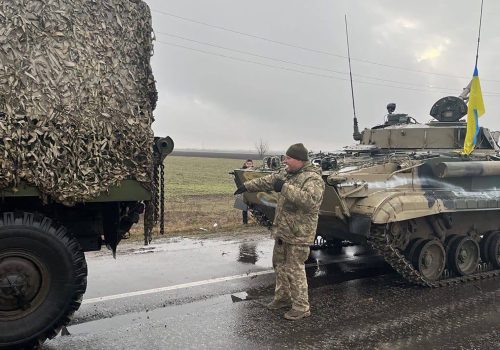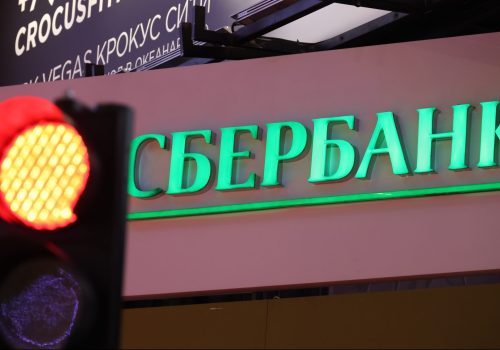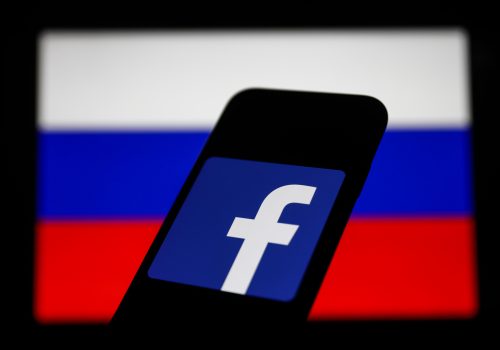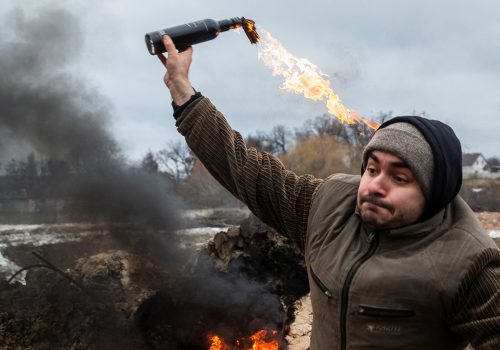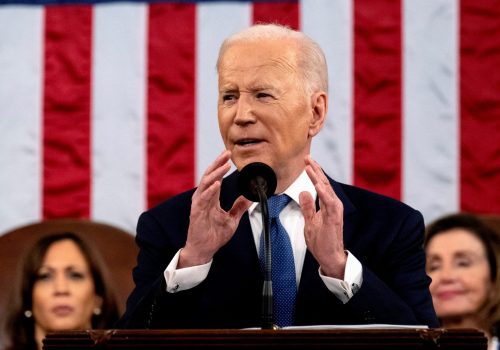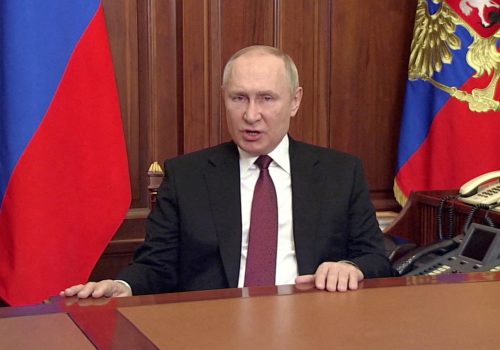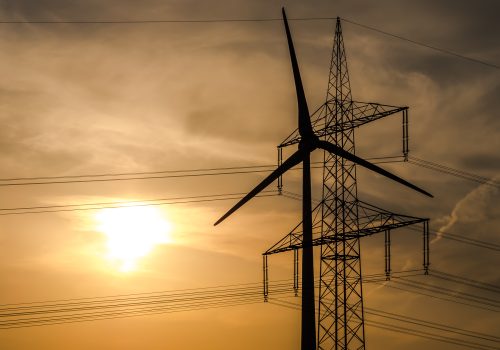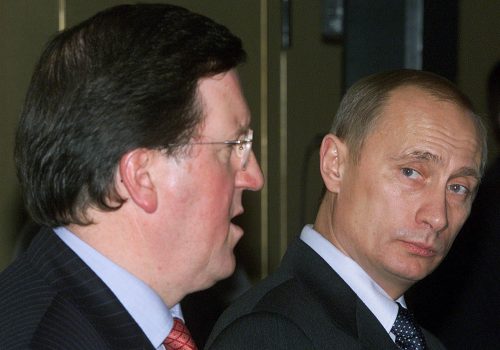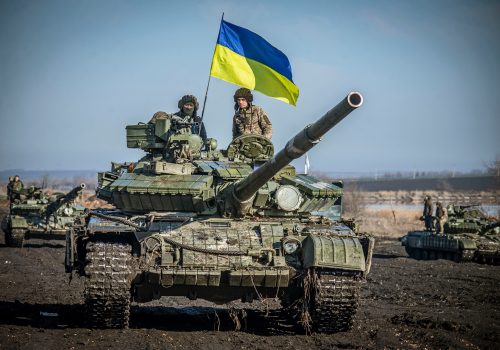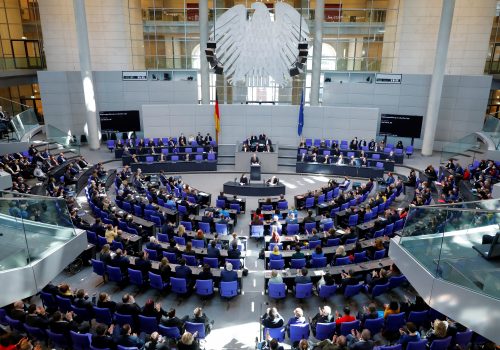Russian forces capture key Ukraine nuclear plant
As Russia further escalates its military assault on Ukraine—and with the future of European security and the post-Cold War international order at stake—check back here for the latest insights, analysis, and reporting from the Atlantic Council’s experts as events unfold.
Our latest expert insight and intel:
March 4, 2022 | 8:23 PM WASHINGTON, 3:23 AM KYIV
To decipher Putin’s nuclear threats, watch what he does—not what he says
By Matthew Kroenig, Mark J. Massa, and Alyxandra Marine
Now that Russian President Vladimir Putin has ordered his country’s nuclear forces on high alert for the first time since the end of the Cold War, this is a time for vigilance.
No signs yet suggest the bulk of Russian nuclear forces actually are on high alert as part of Moscow’s “special regime of combat duty.” But what’s clear is that Putin’s televised order last week was designed to tell the United States, NATO, and the West to desist from supporting Ukraine—or risk unimaginable consequences. While Washington and its allies have been right to avoid overreaction so far, Putin will likely continue his nuclear saber-rattling, and there is still a risk that he would use nuclear forces in Ukraine.
Although the announcement was an alarming development, it was also foreseeable. Nuclear signaling is a key part of Russia’s military strategy and its self-image as a world power. That the Kremlin is now showing signs of implementing its so-called escalate-to-deescalate strategy should come as no surprise to those familiar with Russian doctrine. The West must recognize this for what it is: a form of nuclear blackmail to which the United States and its allies should not capitulate.
Continue reading
March 4, 2022 | 5:33 PM WASHINGTON, 12:33 AM KYIV
Russian War Report: Global crackdown on Russian state-affiliated media continues as Russia blocks Facebook
By Digital Forensic Research Lab
In response to the invasion of Ukraine, governments and corporations have implemented new regulations and policies to mitigate the reach of Russian state-affiliated media within their borders and on their services.
Notably, the Council of Europe filed a regulatory amendment that effectively bans two Russian state media outlets, RT and Sputnik. In response, Meta, TikTok, and Twitter announced that they would comply, restricting the outlets across their platforms in the European Union. At the same time, YouTube took similar measures, with company officials noting that it will take time to ramp up its efforts. RT and Sputnik content remains accessible on these services outside the European Union, although multiple platforms are taking steps to demonetize, de-rank, or add labels to limit their spread.
Continue reading
March 4, 2022 | 4:51 PM WASHINGTON, 11:51 PM KYIV
Sanctioning Putin’s Ukraine War: Time to cut academic ties with Russia?
By Richard L. Hudson
In all the talk of sanctions against Russia, there’s one important area that is only beginning to get some high-level attention: scientific and academic cooperation. If the West’s efforts to isolate Russia are to succeed, this sector needs clearer guidance from government.
Consider the stakes. Russia has the fourth-largest scientific and technical workforce in the world. It has an especially strong publication record in materials science, artificial intelligence, and robotics.
Crucially, Russian science depends on Western cooperation. According to UNESCO, 24 percent of Russian scientific papers from 2017 to 2019 were co-authored with international partners, especially Americans and Germans.
Yet so far, while the NATO allies have been fairly unified in how to handle Russian banking, trade, technology and oligarchs, they have only nibbled at the edges of the scientific world. It is, of course, a big and complicated sector that spends more than two trillion dollars a year globally.
Continue reading
March 4, 2022 | 12:29 PM WASHINGTON, 7:29 PM KYIV
Will Finland and Sweden join NATO now?
By Anna Wieslander and Christopher Skaluba
A historic shift is taking place in Finland. For the first time, most Finns want to join NATO. Across the Baltic Sea, Swedes are becoming more favorable towards membership as well. Sparked by Russia’s full-scale invasion of Ukraine, this might lead to a major foreign-policy shift for the militarily non-aligned Nordic states. But it is not easy to take out insurance when the house is already on fire.
As many as 53 percent of Finns are now in favor of joining NATO, according to polling conducted from February 23-25 (the Russian invasion began on February 24). That’s a dramatic change: In 2017, the same poll showed only 19 percent of Finns wanting to join NATO, and the figure had remained rather stable over time. Polls in favor of joining NATO were up in Sweden as well, with 41 percent supportive in a poll released February 25, compared to 37 percent in January. Public endorsement for membership in Sweden has hovered around 35 percent since the Russian annexation of Crimea in 2014.
Clearly, Russia’s unprovoked war is pushing the two countries closer to NATO membership than ever before. Moscow´s recent, aggressive threats that joining NATO would bring “military and political consequences” upon Finland and Sweden seem to have had the opposite effect on the public. Rather than hiding in the ditches, Finns and Swedes are turning to the Alliance for security.
Continue reading
March 4, 2022 | 10:51 AM WASHINGTON, 5:51 PM KYIV
Ukraine’s path to the EU won’t be quick or easy
Ukraine’s application to join the European Union was greeted warmly in Brussels this week, but how easy is it to join the bloc? Our Europe Center shows what the process will look like for Ukraine and other potential members—and why it could take years.
🇪🇺 accession is a fundamentally member state-driven process via the European Council, where each member state is represented, not the European Parliament (and the EP’s resolution lacks legal force)
— Europe Center (@ACEurope) March 3, 2022
More on the distinction here: 2/8 https://t.co/0Zflv9F0HY
The Commission then screens the candidate’s preparation. Formal negotiations only begin if the Council again approves. These take years as candidates sync policies to 🇪🇺 rules across the board. Negotiations are only completed once all “chapters” across are closed. 4/8
— Europe Center (@ACEurope) March 4, 2022
If negotiations close, an accession treaty can be signed. The treaty must have the support of the 🇪🇺Council,
— Europe Center (@ACEurope) March 4, 2022
Commission, and Parliament. It must also be ratified by all 🇪🇺members.
Timeline? At least 5 years
See how long Croatia’s entry took: 6/8 https://t.co/bCmXR3wEP3
This is to say that EU membership will not come immediately for Ukraine or other EU hopefuls.
— Europe Center (@ACEurope) March 4, 2022
But per @vonderleyen 🇺🇦 “is one of us.” (8/8)
March 4, 2022 | 9:18 AM WASHINGTON, 4:18 PM KYIV
The Russian Central Bank is running out of options
The United States, European Union, and United Kingdom surprised almost everyone this week by sanctioning the Central Bank of Russia (CBR). By freezing the bank’s assets in their jurisdictions, Western allies hope to deprive Moscow of one of the key planks of its “Fortress Russia” self-reliance strategy: the CBR’s $630 billion stockpile in reserves.
Over the past six days, the CBR has innovated quickly to keep the largest possible set of monetary policy tools, including foreign currency buffers, at its disposal. But this has also forced it to break taboos—from capital controls and closed stock markets to allowing banks to hold off on re-valuating their assets. That’s why the bank could quickly run out of options as sanctions begin to bite and the credit market seizes up.
Continue reading
March 4, 2022 | 8:24 AM WASHINGTON, 3:24 PM KYIV
Russian forces capture key Ukraine nuclear plant
Today, we’re closely following these major stories:
First, Ukrainian authorities said Friday the Russian military had seized a nuclear power plant—Europe’s largest—in the southern city Zaporizhzhia after fierce fighting. A fire that had broken out was later extinguished, and international officials say there are so signs of a radiation leak.
Meanwhile, Ukrainian emergency officials now say at least 47 people are dead after recent Russian strikes on residential areas of the northern Ukrainian city of Chernihiv.
And as Western leaders struggle to find ways to further deter Russian President Vladimir Putin from continuing his assault on Ukraine, Europe Center senior fellow Ben Judah believes cutting energy imports from Russia would go a long way:
The truth is the one thing that will decisively threaten to topple the Putin dictatorship, remove its ability to repress Russians and wage war on Ukrainians is break-neck EU decarbonisation. The West pays Putin $750m a day for oil, gas and coal. Vastly more “aid” than Ukraine.
— Ben Judah (@b_judah) March 4, 2022
MARCH 3, 2022 | 4:00 PM WASHINGTON, 12:00 AM KYIV
Europe needs to prepare for a future without Russian energy
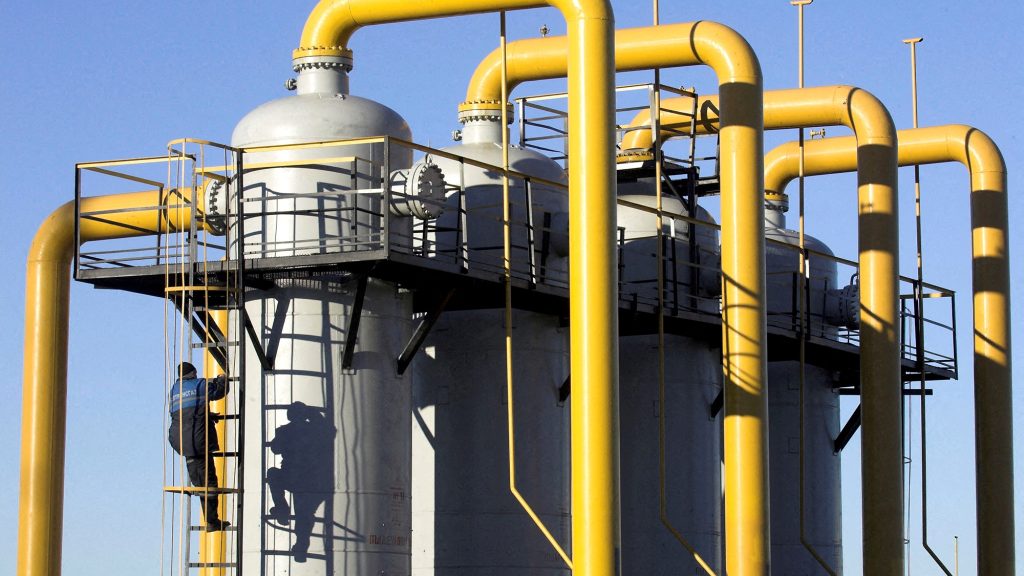
By Michael John Williams and Erin Hodges
As Russia ramps up its invasion of Ukraine, it’s increasingly obvious that Europe and the United States need to build resiliency against further hostile actions from the Kremlin such as the weaponization of energy. Western states have been left scrambling for nonmilitary interventions—but the problem for NATO is that European allies are far more sensitive to economic sanctions against Russia due to their greater fiscal and trade exposure to Russia. And worryingly, they still lean on Moscow as a major energy supplier—particularly of natural gas. Washington needs to break this dependency and more broadly help soften the economic blow to Europe.
While Russia accounts for less than 5 percent of the European Union’s (EU’s) total trade in goods, 40 percent of its gas imports come from Russia. The transition to green energy sources has not kept up with the bloc’s energy needs, and household utility bills have skyrocketed. To boost resiliency, the West must pursue a major decoupling from Russian energy and focus on building a stronger transatlantic partnership. One of Russian President Vladimir Putin’s greatest assets is Western reliance on Russia; to move forward, this relationship must shift from one of necessity to one of convenience—which is also expendable if the geopolitical situation calls for it.
Continue reading
MARCH 3, 2022 | 1:43 PM WASHINGTON, 8:43 PM KYIV
Inside Vladimir Putin’s criminal plan to purge and partition Ukraine
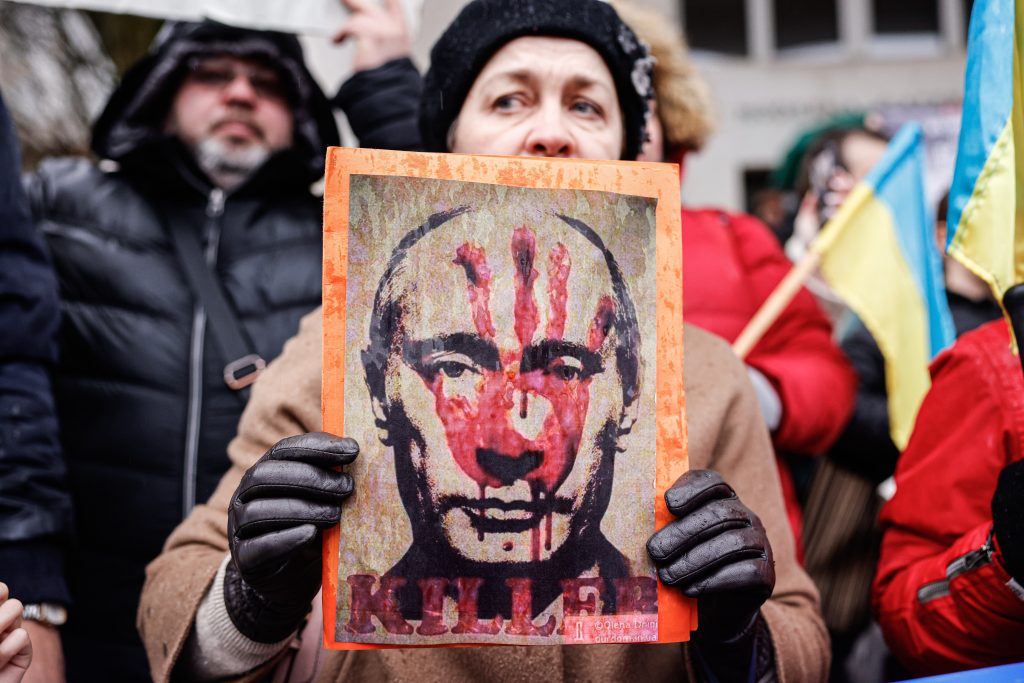
By Taras Kuzio
As Vladimir Putin’s invasion of Ukraine continues to escalate, many are asking what the Russian dictator ultimately hopes to achieve. During his March 3 phone call with French President Emmanuel Macron, the Russian ruler made clear that he is committed to taking full control of Ukraine and “neutralizing” the country. Following their conversation, Macron warned that “the worst is yet to come.”
A detailed and presumably regime-sanctioned article published simultaneously by a number of Kremlin-linked news sites on February 26 offers a window onto what Putin’s end goal in Ukraine might look like. The article lavished praise on Putin for taking the decision to resolve the “Ukrainian question” for future generations. Due to the setbacks faced by Russian forces in Ukraine during the first days of the invasion, the article appears to have been deemed premature and was subsequently deleted can still be accessed in archive format.
The picture that emerges from this chilling text is of the complete military conquest of Ukraine followed by a partition and a massive purge of the civilian population. Putin’s apparent objective is to eradicate all vestiges of Ukrainian identity while condemning the country to a grim future as a military dictatorship locked firmly inside a new Russian Empire. This nightmarish vision tallies closely with Putin’s own stated objectives for the current military campaign along with his long record of public contempt and animosity towards Ukrainian statehood.
Continue reading
MARCH 3, 2022 | 1:41 PM WASHINGTON, 8:41 PM KYIV
As sanctions take effect, oligarch yachts are being seized
#Germany seizing #Usmanov‘s yacht shows that tackling #moneylaundering is most effective when tied to a #Security goal and prioritization by #LawEnforcement. The floating palace became blocked property just hours after #EU #sanctions went into effect. Shockingly impactful. 🧵
— Julia Friedlander (@jfriedlanderdc) March 3, 2022
March 3, 2022 | 11:15 AM WASHINGTON, 6:15 PM KYIV
Civilian casualties mount as Russia hammers residential neighborhoods
Today, we’re closely following these major stories:
First, Ukrainian authorities said at least 22 people were killed after Russian forces shelled non-military targets in the northern city of Chernihiv. Meanwhile, UN High Commissioner for Human Rights Michelle Bachelet claimed the eastern city of Volnovakha has been nearly leveled by Russian artillery strikes
Amid the violence, delegations from Russia and Ukraine met for a second round of peace talks Thursday, during which Kyiv said it would call for humanitarian corridors out of besieged cities.
March 2, 2022 | 8:12 PM WASHINGTON, 3:12 AM KYIV
Russia Crisis Military Assessment: Why did Russia’s invasion stumble?
By Atlantic Council military fellows
During the first week of the war, Russian ground forces have become bogged down outside of the northern Ukrainian cities of Kharkiv and Kyiv due to their failure to establish air superiority (which has resulted in significant aircraft and helicopter losses), too few troops to execute three simultaneous thrusts (toward Kyiv and Kharkiv, and north from Crimea), poor coordination of fires and maneuver, significant logistical issues, and stronger than expected Ukrainian resistance. Russia’s naval superiority in the Black Sea has contributed to success in its southern area of operations, with Russian forces breaking out from the Crimean Peninsula and taking territory in southern Ukraine. Although Ukraine has fought well and disrupted plans for a quick and decisive Russian victory, the situation is still perilous. Russia is moving to encircle Kyiv and Kharkiv and appears to have switched to indiscriminate long-range fires—resulting in significant collateral damage in residential areas—and is making significant progress in the south.
Continue reading
March 2, 2022 | 4:24 PM WASHINGTON, 11:24 PM KYIV
Here’s why crypto won’t save the Kremlin from sanctions
Amid the escalating war in Ukraine, some US legislators and former officials have sounded the alarm about Russia using cryptocurrencies to evade American sanctions. In reality, though, Moscow’s abilities to do so are more limited and illusory than they might initially appear.
On Tuesday, the New York Times reported that Moscow’s proposed new “digital ruble” would leave Russia “better able to resist sanctions.” Globally, more than ninety central banks are exploring state-backed digital currencies, known as CBDCs (which the Atlantic Council has been tracking for more than two years). However, the Council’s study reveals several reasons why a digital ruble would not actually be an immediate or easy means of skirting US policy—starting with the fact that a Russian CBDC does not actually exist yet, beyond a limited pilot program for domestic use announced just two weeks ago. It typically takes years to design, decide on, develop, and deploy massive new financial technology like this.
In theory, Russia could use its digital tender to trade directly with other nations without using the dollar as an intermediary currency. That, however, is easier said than done: Internationally, it is unclear why any nation would want large sums of digital rubles on its balance sheet anytime soon. Questions also remain about how widely accepted a digital ruble would be within Russia—particularly since it would experience much of the same volatility and counter-party limitations as the regular ruble in the face of sanctions.
Continue reading
March 2, 2022 | 3:45 PM WASHINGTON, 10:45 PM KYIV
Russian Hybrid War Report: Social platforms crack down on Kremlin media as Kremlin demands compliance
By Digital Forensic Research Lab
Google, Meta, and Twitter are taking action against Russian state-owned media accounts to limit the spread of harmful information online. At the request of the European Union, Meta will restrict access to Kremlin-owned outlets RT and Sputnik across the EU. Earlier, Meta announced it would also restrict access to several Russian state media accounts in Ukraine at the government’s request. In addition, the company has demonetized the accounts of Russian state-owned media organizations and prohibited them from posting ads on Facebook and Instagram.
In a similar move, Google has blocked RT and Sputnik’s YouTube channels across Europe. It will also prevent RT and other relevant outlets from receiving funding from ads on their websites and apps.
Meanwhile, Twitter announced actions to reduce the spread of articles from Russian state-affiliated media. Links to Kremlin media will now include a “stay informed” label. Since the start of the invasion, there has been an uptick in the sharing of Kremlin media articles on Twitter, with more than 45,000 tweets a day directing users to state-affiliated outlets.
Continue reading
March 2, 2022 | 10:17 AM WASHINGTON, 5:17 PM KYIV
Molotov Cocktails in winter: What 1939 Finland tells us about Ukraine today
By Ann Marie Dailey
As Russian forces approached the northern outskirts of Kyiv last week, Ukraine’s defense ministry sent out a tweet urging the capital city’s citizens to “prepare Molotov cocktails.”
The incendiary weapon, popular with revolutionaries, insurgents, protesters, and routine troublemakers for nearly a century, earned its name during the 1939 Soviet invasion of Finland, known as the Winter War.
Moscow’s troops entered Finland on November 30, 1939, confident that they could conquer the country in three weeks. After all, Finland had only gained an army following its independence from the Soviet Union in 1918. The Finns, however, would not roll over without a fight. Legend goes that when one Finnish soldier saw the Soviet army advancing on his homeland, he remarked, “So many Soviets. Where will we find room to bury them all?”
Continue reading
March 2, 2022 | 7:49 AM WASHINGTON, 2:49 PM KYIV
Russia batters major Ukrainian cities as refugees continue fleeing
Today, we’re closely following these major stories:
First, Russian forces are reportedly battering several major cities including Kyiv and Kharkiv—and have claimed to have taken control of the southern hub of Kherson.
Meanwhile, the UN refugee agency claims the number of refugees fleeing Ukraine could soon surpass the one-million mark.
Polish friends tell me they have taken in Ukrainian refugees who arrived in Warsaw. “Of course we did,” they said, “It used to be us.”
— Daniel Fried (@AmbDanFried) March 2, 2022
March 2, 2022 | 8:15 AM WASHINGTON, 3:15 PM KYIV
State of the Union: Lessons from Biden’s moves on Russia and the US economy
By Atlantic Council experts
Against the backdrop of Russia’s war in Ukraine and rising inflation at home, US President Joe Biden delivered his first State of the Union address Tuesday night—a speech closely scrutinized from Washington to Moscow. Our experts were watching, too, so we asked them about the key questions raised by his hour-long address:
Continue reading
March 2, 2022 | 6:00 AM WASHINGTON, 1:00 PM KYIV
Shock and awe in Ukraine? Not yet
So far, Putin’s strategy is not working, even though at this point, significant Russian forces are closing in on Kyiv. Would shock and awe have worked?
Shock and awe was developed as an alternative to Desert Storm and the 1991 Iraq War, in which an overwhelming force led by the United States required 400,000 troops to eject Iraq from its occupation of Kuwait. In 2003, could regime change have been imposed without marching to Baghdad with an overwhelming military force?
Shock and awe was designed to affect, influence, and control the will and perception of an adversary. Former Secretary of Defense Donald Rumsfeld, who was a “rump” member of the shock and awe team later put it this way: “to get the other guy to do what we want and stop doing things we do not want him to do.”
The aim was to win without fighting, using a variety of military and non-military instruments to place the enemy in such a desperate situation that the blunt choice was surrender or suicide, capitulation or catastrophe.
How would Russia and Putin have employed a real shock and awe campaign in Ukraine?
Continue reading
March 1, 2022 | 3:59 PM WASHINGTON, 10:59 PM KYIV
Ukraine’s call for foreign fighters brings too many risks
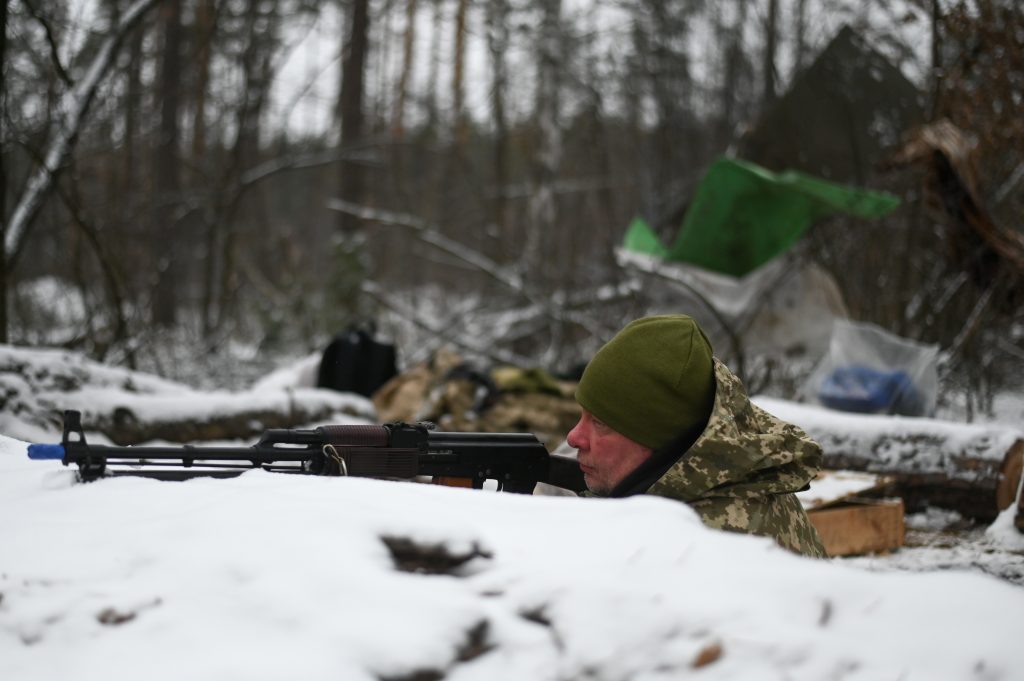
Share this entry by copying this link.
By Jim Danoy
Ukraine President Volodomyr Zelenskyy’s call for foreigners to come to his country and take up arms against Russian invaders is fraught with danger—for his nation and the world. First, it will do little to enhance his government’s defensive capability. Instead, it will likely hamper Ukrainian military operations. Vetting and training of potentially large numbers of foreign volunteers, molding them into a cohesive force, and integrating them into the overall resistance effort will divert attention and resources away from what should be Kyiv’s priority: enhancing the fighting capability of Ukraine’s Territorial Defense Forces and National Guard.
Most concerning, however, is the prospect that Zelenskyy’s invitation to “anyone who wants to join the defense of Ukraine” could precipitate an unregulated influx of unsavory foreign fighters, mercenaries, and other malign actors into the country. The presence of undisciplined combatants with agendas of their own would turn Ukraine into an extremist battleground. An increase in atrocities at the hands of these fighters would undermine Zelenskyy’s cause. While foreign combatants have operated in eastern Ukraine since 2014, many of them pro-Russian Serbs supporting Russian separatists, the numbers have been modest and limited to the Donbas region. If armed foreigners with no clear allegiance or accountability were to overrun all of Ukraine, it would only serve Russian President Vladimir Putin’s purposes. If he can’t subjugate the country and install a puppet government, he might decide to push Ukraine into becoming a failed state, regardless of the implications for the rest of Europe and Russia.
Zelenskyy’s call for foreign fighters to fight for Ukraine is both noble and understandable, reflecting frustration over what he views as a circumscribed Western response to Putin’s invasion. However, NATO and the West must not encourage the influx of international fighters into Ukraine. They should instead counsel Zelenskyy of the risks, work with his government to interdict the flow of foreign combatants and extremists into the country, and accelerate the provision of much-needed military support to Ukraine’s armed forces, intelligence operatives, and security services.
—Jim Danoy is a non-resident senior fellow in the Scowcroft Center’s Transatlantic Security Initiative. He served as the National Intelligence Manager for Europe and NATO at the Office of the Director of National Intelligence. His assignments included postings at NATO and US European Command in Stuttgart, Germany.
March 1, 2022 | 12:27 PM WASHINGTON, 7:27 PM KYIV
Ukraine has made a request to take Russia off the internet. That’s a bad idea.
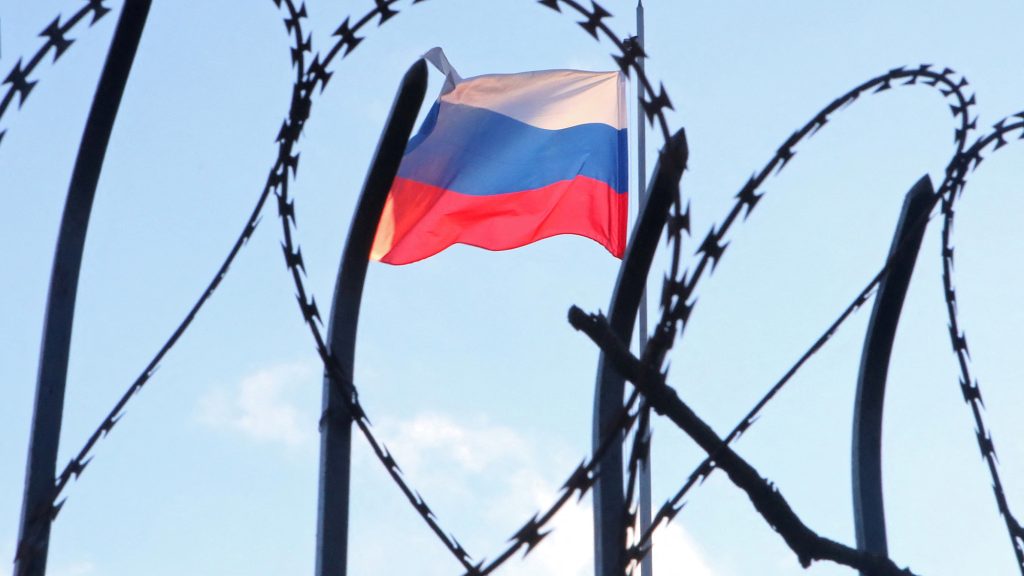
Share this entry by copying this link.
On Monday, the Ukrainian government sent a letter to the Internet Corporation for Assigned Names and Numbers (ICANN), asking that the organization revoke the domain names for “.ru,” “.рф,” and “.su,” as well as other Russian internet domains—effectively making all websites with those endings unavailable. Vladimir Putin’s “atrocious crimes,” the Ukrainian government wrote, “have been made possible mainly due to the Russian propaganda machinery using websites continuously spreading disinformation, hate speech, promoting violence and hiding the truth regarding the war in Ukraine.” (ICANN has not posted the letter on its website but confirmed its authenticity to Rolling Stone.)
This is a monumental request, asking ICANN to effectively disconnect large swaths of the Russian internet. And however noble the motives, it is not a good idea. The Kremlin is spreading volumes of propaganda and disinformation about Ukraine, but this is not the way to go about addressing it, and ICANN taking action against Russian domains would undermine the ability of everyday Russian internet users to get access to information about the Ukraine conflict. It is this kind of essential information—showing the truth about the Putin regime’s illegal, aggressive, large-scale invasion of Ukraine and its killing of Ukrainian civilians—that might drive some change in the politics of Russian elites and the general citizenry.
Moreover, as Robert Morgus and I wrote in 2019, there are myriad reasons not to treat removing Russia from the internet as an effective, punitive measure. Three years ago, the discussion was about a hypothetical US cyber operation against core Russian internet infrastructure, but many of the same considerations apply. Making Russian websites inaccessible could diminish or remove the Kremlin’s disincentives for cyberattacking global internet infrastructure—and may result in further attempts to destabilize the global internet or content hosted on other domains (like those in Ukraine).
Russian internet filtering capabilities have been partially effective in domestically blocking or slowing access to websites, like with Moscow’s 2021 throttling of Twitter: It slowed access to Twitter but also inadvertently slowed access to other domains. If Russian websites were rendered inaccessible, however, that might cause the Kremlin to just try to throttle or block everything it could from within Russia, ranging from Facebook, Twitter, and TikTok to foreign press websites. The free flow of information into Russia is a key front in Ukraine’s information campaign and an important mechanism to drive political change in Moscow and beyond.
ICANN is unlikely to grant this request, if only because of how extensive it is. Instead of following through with Ukraine’s request, it’s vital for journalists and citizen activists to spread information within Russia about the Kremlin’s actions, for social media platforms to cut off Russian state propaganda themselves, and for organizations like ICANN not to set dangerous precedents like revoking entire domains for a country.
—Justin Sherman (@jshermcyber) is a fellow at the Atlantic Council’s Cyber Statecraft Initiative.
March 1, 2022 | 7:55 AM WASHINGTON, 2:55 PM KYIV
Attacks continue on Ukraine’s second-largest city as Russian convoy heads for Kyiv
We’re closely following two major stories breaking on Tuesday:
First, a Russian strike reportedly targeted a regional administration building in central Kharkiv, killing at least seven people. That’s a day after Ukrainian officials accused Russia of shelling residential areas in the same city.
Second, satellite imagery suggests a 40-mile-long convoy of Russian armor and vehicles is making its way to Kyiv for an assault.
Meanwhile, Europe Center senior fellow Ben Judah weighs in against increasingly loud calls for a NATO-imposed no-fly-zone over Ukraine.
March 1, 2022 | 6:17 AM WASHINGTON, 1:17 PM KYIV
Rapid Response: The future of European energy security
By EnergySource
Atlantic Council Global Energy Center experts and friends have assembled a thorough—though by no means exhaustive—list of recommendations that, if implemented, would advance European energy security. These actions, if taken now, will have impact along three rough timeframes:
- Impact by next winter (a crucial timeline if the crisis continues due to increased energy demand in the winter).
- Impact in the next 1 – 3 years.
- Impact in 3 years and beyond.
Continue reading
FEBRUARY 28, 2022 | 4:17 PM WASHINGTON, 11:17 PM KYIV
What’s driving Putin’s invasion of Ukraine? A former NATO chief who met him explains.
By Lord George Robertson
There is an old saying: “In Russia, everything changes in twenty years; nothing changes in two hundred years.”
But maybe it gets to the heart of the recent crisis, when the unthinkable became the inevitable.
Over the last few weeks, I have been wondering, with the rest of the world, what is inside the head of the man who has, alone, ordered the violent invasion of a sovereign nation state in the year 2022. The head of the man I met nine times—in the Kremlin and Brussels, with whom I did good business, with whom we created the twenty-strong NATO Russia Council, with Russia an equal at the table.
The head of the man who personally signed accords guaranteeing the right of nations—and Ukraine specifically— “to choose the means to ensure their own security, the inviolability of borders.” The head of the man who asked me about when we were going to invite Russia to join NATO.
Continue reading
FEBRUARY 28, 2022 | 1:28 PM WASHINGTON, 8:28 PM KYIV
Putin has fatally underestimated Ukrainians
By Inna Sovsun
Russian President Vladimir Putin has made a terrible miscalculation.
When he launched his full-scale invasion of Ukraine on February 24, Putin apparently thought it would be possible to wage war specifically against the country’s political leadership. He appears to have fallen into the trap of believing his own propaganda and assuming today’s Ukraine was just like modern Russia, with its largely passive and apolitical population. Based on his own experience of dictatorial government, Putin thought it would be a relatively simple task to intimidate or remove a few key Ukrainian leaders and take over the country.
Instead, he now finds himself at war with an entire nation of 40 million.
Continue reading
FEBRUARY 28, 2022 | 10:05 AM WASHINGTON, 5:05 PM KYIV
Fresh Russian strikes on Ukraine, new US sanctions against Russia’s central bank
Our experts are closely following two major stories breaking on Monday:
First, Russian forces have reportedly shelled residential areas in the eastern Ukrainian city of Kharkiv—just as delegations from Russia and Ukraine met for peace talks.
Meanwhile, the US Treasury Department has prohibited American individuals and entities from conducting business with Russia’s central bank—in addition to freezing the institution’s assets in the United States.
Atlantic Council nonresident senior fellow Eddie Fishman, who served on the US Secretary of State’s policy-planning staff, weighs in on the implications of the move:
That’s in addition to the ruble crashing in response to the announcement of Western sanctions against Russia.
FEBRUARY 28, 2022 | 08:37 AM WASHINGTON, 3:37 PM KYIV
Rubles on the run
In his latest Guide to the Global Economy newsletter, the Council’s Josh Lipsky, director of the GeoEconomics Center, breaks down what the West’s financial offensive against Russia might mean:
In 1896, Czar Nicholas II instituted sweeping currency reforms that placed the ruble on the gold standard.
The result was a thriving economy—but one dangerously more dependent on global finance than ever before. To see why some things never change, check out our new analysis below:
The G7 has done something that was previously unthinkable. They froze the foreign reserve assets of the eleventh-largest economy in the world, locking up what we estimate is nearly $400 billion. To put that in perspective, it’s like losing the entire GDP of Austria from your bank account overnight.
But who actually has Russia’s money? First, China. They are the leading holders of reserves and that’s probably making Governor Nabiullina breathe just a bit easier.
But look at everyone else. It’s Europe and Asia, not the United States, where Russia has parked its cash. At least that’s what the Kremlin would like everyone to believe.
There’s a difference between where money is held and what kind of money is held there. Just because Japan has 13 percent of Russia’s foreign reserves, that doesn’t mean it’s holding it in yen. In fact, it’s almost certainly not.
We know from International Monetary Fund records that yen only accounts for 7 percent of total Russian reserves. A little financial forensics tells us that there are far more dollars out there than people are pricing in.
Moscow has made a big show of creating “Fortress Russia” over the past decade—a buildup of gold reserves and non-dollar currency that would make it immune to sanctions. But it’s all a myth.
After Russia opened for business on Monday, it found itself—for the first time in a generation—isolated from the global financial system.
FEBRUARY 27, 2022 | 3:33 PM WASHINGTON, 10:33 PM KYIV
Experts React: What’s behind Germany’s stunnign foreign policy shift?
By Atlantic Council experts
This past week saw Germany reverse decades of foreign-policy precedent in the face of Russia’s war with Ukraine. First, new Chancellor Olaf Scholz announced that Germany would block the Nord Stream 2 natural-gas pipeline from Russia. On Saturday, Scholz promised to arm Ukraine with one thousand anti-tank weapons and five hundred Stinger missiles and lifted restrictions on German weapons being sent to conflict zones by third parties. Finally, in a groundbreaking speech in the German Bundestag, he most notably committed to spending more than 2 percent of his country’s gross domestic product (GDP) on the military—meeting a NATO target that Berlin had long lagged.
Why did this huge shift occur, and what does it mean for Germany’s future on the world stage? Our Europe Center experts weigh in:
Read last week’s live updates:
Image: This image shows a damaged administrative building of the Zaporizhzhia nuclear power plant in Enerhodar, Ukraine on March 4, 2022. Photo by Press service of National Nuclear Energy Generating Company Energoatom/Handout via REUTERS
